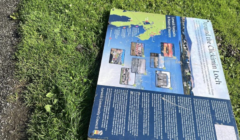Education / School league tables ‘fundamentally flawed’
RANKING schools against each other based on a single performance indicator has been criticised by local education officials again after national newspaper The Times published its latest annual ‘league table’ of attainment.
Figures from the newspaper showed that 41 per cent of pupils at the Anderson High School in Lerwick achieved five or more qualifications equivalent to highers, placing it at 96th in the table.
That figure for Brae High School stood at 23 per cent, meaning it was 281 out of 339 on the list.
Shetland was above expectations when using a ‘virtual comparator’, or benchmark, but Shetland Islands Council’s children services team said the methodology used by The Times remains “fundamentally flawed”.
Quality improvement officer Peter Haviland said using one performance indicator – in this case five or qualifications at SCQF level six – was “inadequate”.
The Times says that the Scottish Government’s comparator “tries to estimate how well the school is doing compared with others with similar levels of local deprivation and other challenges”.
Haviland said this has limitations – “the main problem is that it takes account of SIMD (the Scottish Index of Multiple Deprivation)”.
Education expert Professor Lindsay Paterson told The Times that “all it shows is that the government’s data is useless at recording rural poverty”.
“It is not helpful to create league tables or base a school’s performance on a single indicator, particularly when, with small school rolls, the numbers of pupils presented for and achieving in those exams can fluctuate widely,” Haviland added.
“It is far more important and valuable to look at how schools are performing across the board and for all children. The four measures of improving attainment in literacy and numeracy, increasing post-school participation, improving attainment for all, and tackling disadvantage, are all connected and need to be looked at together in considering the performance of a school or local authority.
Become a member of Shetland News
“Headteachers, with support from central officers, know exactly where their schools are at and the areas where they are seeking improvement. They are using a far greater breadth and depth of data at a much deeper level to drive school improvement, not just for higher attainers but for every pupil in their school.
“In addition, Shetland is a leading participant in work that is being done at regional and national level to find meaningful ways of measuring rural poverty.”
League tables also came under attack from the Shetland branch of the teaching union EIS.
Local association secretary Matthew Moss said the union “does not support the use of school performance data to construct unreliable and simplistic league tables, a practice that has been discredited and is no longer officially used in Scotland”.
“Parents, pupils and staff know that in reality schools are far more complex and cannot be properly represented by one set of examination results,” he added.
“League tables are a flawed approach that produce unreliable and highly questionable results.”
The chairman of Shetland Islands Council’s education and families committee George Smith, meanwhile, highlighted that learning is not just about traditional subjects and the classroom.
“Shetland Islands Council will always work hard to try to ensure all young people can achieve their potential,” he said.
“This will include through formal education but also through the contributions of other services and partners who support young people to benefit, for example, from youth work, sport and leisure, outdoor education and creative opportunities including music and drama.
“While educational attainment will be very important for many young people the creation of a league table in the way The Times has done is to simplify what is a more complex matter.”
Become a member of Shetland News
Shetland News is asking its many readers to consider paying for membership to get additional features and services: -
- Remove non-local ads;
- Bookmark posts to read later;
- Exclusive curated weekly newsletter;
- Hide membership messages;
- Comments open for discussion.
If you appreciate what we do and feel strongly about impartial local journalism, then please become a member of Shetland News by either making a single payment, or setting up a monthly, quarterly or yearly subscription.
















































































